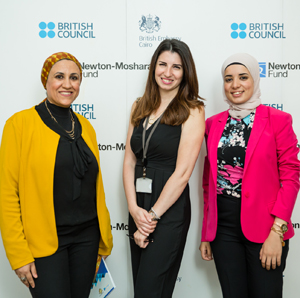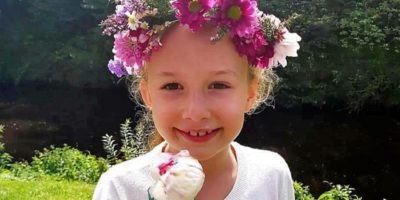Shaimaa El Banna is the head of science programmes at British Council Egypt, having joined the organisation in 2011. Shaimaa has qualifications in political science and public administration from Cairo University. She now manages the Newton Mosharafa Fund, a £55 million joint programme between Egypt and UK.

“There are significant numbers of young women engaging in STEM activity, despite there being considerable barriers to female engagement; there are considerable opportunities available to women through scholarships and policies, and yet structures and cultural norms are holding back true access and participation. Egypt has a strong tradition of female empowerment and development but remains patriarchal in many aspects of progress and opportunity; the number of women in STEM education does not translate to those in the workforce.”
Before becoming the first female head of science in British Council Egypt
I graduated in economics and political science with an honour’s degree in top 10 of my class at Cairo University; my major is political science and minor is statistics. After that, I have done post-graduate studies on public administration with comparative studies on governance in international organisations and NGOs (non-governmental organisations).
I have more than 20 years of work experience in development in Egypt. I started as a researcher in the faculty of economics and political science from my university and then joined the Association for Development and Enhancement of Women as head of media and training unit to work on empowering women and females’ heads of households in Egypt.
At a later stage, I was the senior training manager for the “Women Entrepreneurship and Leadership Program” at the American University in Cairo and managed the Goldman Sachs 1000 Women entrepreneurs in MENA (Middle East and North Africa) region.
Finally, before moving to the British Council and becoming the first female head of science in British Council Egypt, I worked with USAID as head of their internship ownership and grant programme targeting agriculture development in Egypt in cooperation with the Ministry of Higher Education and Technical Education.
The British Council and what their head of science does
The British Council is the United Kingdom’s international organisation for cultural relations and educational opportunities. Our purpose is to create international opportunities for the people of the UK and other countries and build trust between them worldwide.
The British Council’s office in Egypt was established in 1938 as one of our first overseas offices, and it remains one of our most important operations today. We are delighted to be celebrating our 80th anniversary in Egypt in 2018.
We work in three key areas: arts, English and education, and society, with a focus on young people. The themes of ‘employability’ and ‘voice’ cut across all the work we do.
As head of science, I’m responsible for leading the British Council Egypt’s science portfolio including the business delivery of the Newton-Mosharafa Fund, the largest programme in the MENA region; FameLab, one of the largest science communications competitions in the world; in addition to other science work like Science Café and researchers capacity building and professional development programmes.
I’m also responsible for managing partnerships and business development and increase the sustainability of the science portfolio in Egypt.
In addition to the above, my day to day job includes close relationships with young scientists and researchers; to be always part of their wider community to be aware of their needs and challenges to better inform us while designing new activities.
Women in STEM in Egypt
Egyptian women’s contribution and presence in STEM fields can be traced to the times of the Pharaohs. In ancient Egypt, records do not only show that women enrolled in science education but that there were around 100 female pioneers in the STEM domain.
A prominent female doctor at that time is Merit Ptah, the first-ever named female doctor as well as the first woman in the pharmaceutical field.
CAPMAS reported that, in 2014/2015, women made up 48% of the total number of graduates in STEM subjects that same year. CAPMAS also reported that in 2014, women constituted 48% of graduates with a master’s degree and 39% of those who received a doctorate.
The engagement of women in STEM in Egypt – at least within academia — is quite high. Women graduating with a STEM degree represent 35.3% of scientific professionals, according to the CAPMAS 2017.
According to the UNESCO Institute for Statistics (2018), there is an estimated 44% of women engaged in scientific research in Egypt. An earlier UNESCO report (2013) estimated that 41% of women are in the field of natural sciences, 18% are in the field of engineering and technology, 46% in the field of medical science, and 28% are in the field of agricultural science.
British Council Egypt conducted research on Women in STEM in Egypt in April 2020. The research concluded that gender diversity is needed in the STEM field to achieve economic vibrancy, innovation and social equity goals, and failure to incorporate talented women is a waste of effective human resources.
Our research sample showed that while women are engaging in STEM at the tertiary education level, it is the integration into the labour force which makes it difficult for there to be a more equitable distribution of women across all STEM-related sectors.
There are significant numbers of young women engaging in STEM activity, despite there being considerable barriers to female engagement; there are considerable opportunities available to women through scholarships and policies, and yet structures and cultural norms are holding back true access and participation. Egypt has a strong tradition of female empowerment and development but remains patriarchal in many aspects of progress and opportunity; the number of women in STEM education does not translate to those in the workforce.
These dichotomies speak to opportunity, rather than pure constraint. An underlying foundation exists to support increased female participation and success in STEM and this needs to be further supported and grown to the point of institutional reality.
Funding Egyptian researchers
The Newton-Mosharafa Fund is a £55 million science and innovation partnership between the UK and Egypt that runs until 2021.
It aims to advance the capacity of the Egyptian science sector; increase the amount of quality scientific research and innovation being carried out in Egypt; and help mitigate social and economic challenges in Egypt through the development of new research and innovation.

We support activities through priority themes as decided by the UK and Egyptian government: sustainable water management, renewable energy, archaeology and cultural heritage, sustainable food production and affordable and inclusive healthcare.
The Newton Mosharafa works through three main programmes: the PhD Scholarship Programme; Institutional Links and finally the Newton Fund Impact scheme.
In addition to those mainstream programmes we also used to offer travel grants for postdoctoral researchers; researcher links and researcher connect workshops for science communication.
Since 2014 we have funded 254 PhD scholarships allowing Egyptian researchers to either complete their full PhD in the UK and we have funded 62 research partnerships linking British and Egyptian institutions to carry out joint research projects worth up to £300,000 each.
The fund works on providing funding opportunities through open competitive calls to early career researchers in partnership with the Egyptian Ministry of Higher Educating and Scientific Research to develop the field of scientific research and innovation through offering PhD scholarships, partnerships projects, and building collaborations to enrich exchange between the UK and Egypt.
Newton Mosharafa is government to government partnership funded by the Department for Business, Energy and Industrial Strategy (BEIS) in the UK and the Ministry of Higher Education and Scientific Research in Egypt.
Empowering female scientific researchers
Gender is mainstreamed in all our activities. The Newton Mosharafa supports women in STEM by providing an opportunity for women, female researchers and scientists to contribute in science, medicine, engineering, technology and mathematics, which is a core requirement for achieving sustainable development goals by 2030.
The fund empowers women in scientific research by offering them support to build their capacities, achieve academic goals, and lead research projects. Throughout the last six years, 43.7% of our PhD scholarships have been for female researchers.
But it is not all about numbers. Because of our commitment to gender equality, part of the requirement to apply for our NFIS grants is a gender statement submitted by research institution to evidence the impact of their research on gender equality.
I’ve also written an entire article about how this fund empowers women in STEM.
Be as inclusive as possible
British Council implements a twin-track approach to addressing gender:
- Empowering Women and Girls: Programmes that have explicit gender equality objectives and provide opportunities for women to increase their skills, confidence and ability to bring positive change. Under this, we have done a Women in STEM research Programme
- Gender mainstreaming: Ensuring that the concerns of both men and women are integrated into every stage of our activities, projects and programmes. Hence ensuring that we:
- ‘do no harm’ by considering the potential unintended consequences of reinforcing inequalities
- avoid excluding any groups, including women and girls
- be as inclusive as possible to ensure that we are engaging with both men and women through our activity
Under this falls all our programmes like FameLab; Science Café; school lab and professional development programmes.
We are also keen to share successful case studies on female role models in STEM throughout all our social media channels.
Next steps to foster gender equality
The British Council remains strongly committed to fostering the exchange of knowledge and ideas for the mutual benefit of the UK and Egypt – through flagship programmes like the Newton-Mosharafa Fund.
All our projects provide life-changing opportunities for young people in Egypt, instil a sense of community, a sense of international awareness, and a sense of personal responsibility.
We will continue our work together to build long-lasting relationships, trust, understanding and respect between the people of the UK and Egypt.
Supporting collaboration in science and technology is part of the British Council’s charitable objectives. Within the overarching Education and Society strategy, the core purpose of the British Council’s science platform is to work with the UK and overseas partners (Egypt in our case) to strengthen global science communities and fuel prosperity and social benefit for current and future generations.
I’m happy and proud to say that have in the pipeline project supporting equal access for female students to STEM universities in Egypt.
https://www.britishcouncil.org.eg/en









